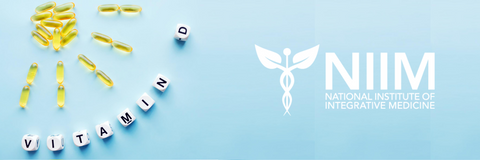“Humans are similar to outdoor plants, we cannot survive without sunshine”
Over recent years much emphasis has been placed on reducing sunlight exposure and as a consequence, we have seen an alarming rise in Vitamin D deficiency. Integrative medicine practitioners have, for a long time extolled the virtues of one single important vitamin– Vitamin D. Now many years and research studies later, the medical establishment is beginning to take seriously the importance of this essential vitamin on our overall health.
Why is Vitamin D so important?
Vitamin D is synonymous with bone health but has other very significant actions in our bodies. It supports our health system in so many ways, impacting directly on every major aspect of our health. There is a growing body of evidence for vitamin D across a wide spectrum of health issues. To illustrate just how important this vitamin is, here are just some of the vital functions it performs:
- Strengthens the immune system
- Strengthens the respiratory system
- Benefits the nervous system
- Is protective for Cardiovascular conditions
- Regulation of insulin secretion and blood sugar control
- Assists with weight management, including carbohydrate and fat metabolism
- Assists with healthy mood and feelings of well-being
- Assists with overall Musculoskeletal function
- Strong and healthy bones, as vitamin D encourages calcium uptake and bone mineralisation
- Dental health
- Aids proper digestion and food absorption
- Vital role in prevention and treatment of chronic illness: Autoimmune illness such as MS, Inflammatory Bowel Disease; Cancer; Heart and Artery Disease, etc.
It may come as a surprise to many Australians that we are a nation where Vitamin D deficiency is so common, despite being a land of warmth and sunshine. An estimated 70% of Australians are Vitamin D deficient.
Unfortunately our exposure to the ‘sunshine vitamin’ is minimal due to several facts, in particular our very high percentage of urban dwellers, the majority of whom work indoors. Covering up with sunscreens and clothing has neglected the essential role of Vitamin D for our survival. We have failed to understand that in order to thrive we need to absorb the sunshine and benefit from the Vitamin D it provides us, just as it does for all living organisms.
There are two primary types of UV rays from sunlight, the vitamin-D-producing UVB rays and the skin-damaging UVA rays. Both UVA and UVB can cause burning. UVA penetrates your skin more deeply than UVB, and contributes to photoaging, skin damage and skin cancers. UVB rays need to come into direct contact with your skin in order to produce Vitamin D. UVB rays can be blocked by glass, but not UVA rays, so you won’t generate Vitamin D by sunlight coming through a window, but it can still give you sunburn. Overall good nutrition with a healthy diet of natural antioxidants is beneficial to counteract the effects of sun damage.
The ethnic diversity of the Australian public brings different challenges to the individual’s ability to produce this vitamin. For example, people with dark skin are at higher risk of deficiency. The dark skin pigmentation acts as a filter to the UVB and reduces synthesis of Vitamin D. People who do not have dark skin, e.g. mainly from Caucasian origin, generally have better production of Vitamin D from sunlight. People who are most likely to have deficiencies will include those:
- who are frail or housebound, such as the elderly
- who never venture outdoors without sunscreen
- who always wear concealing clothing
- breast fed babies may also be at risk as breast-milk contains very little vitamin D.
Vitamin D and COVID-19
The important role of Vitamin D is being explored in the current worldwide pandemic. Researchers from various countries are investigating Vitamin D and its benefits in the context of Covid19 and respiratory infections. The data is showing strong support for the use of Vitamin D in prevention and treatment.
In 2017, a major medical review in one of the British Medical Journal ( BMJ) showed that Vitamin D supplementation was protective against respiratory viral infections, such as colds and the flu. Vitamin D deficiency is common worldwide, especially during winter months. The link between Vitamin D and our immune system clearly shows that low levels of Vitamin D correlate with susceptibility to viral and respiratory infections. Vitamin D levels are an essential protection against viral infections and this has never been more important right now with the Corona Virus threatening the world population.
Most people infected with the COVID-19 virus will experience either no symptoms or mild, moderate or severe respiratory illness. Older people and those with underlying medical problems like obesity, cardiovascular disease, diabetes, chronic respiratory disease and immune-suppressed cancer patients are more likely to develop serious illness. Vitamin D supplementation is one simple step we can all implement right now.
How is Vitamin D made?
Sun energy turns a precursor in the skin into pre-Vitamin D3 which is carried to the liver and then the kidneys where it is transformed into active form used by our bodies: 1,25-dihydroxy Vitamin D3.
When your skin is exposed to sunlight, it makes vitamin D from cholesterol. The sun’s ultraviolet B (UVB) rays hit cholesterol in the skin cells, providing the energy for vitamin D synthesis to occur. Vitamin D has many roles in the body and is essential for optimal health.
So how do I get Vitamin D?
Sunlight exposure of the skin is the best method. However, we must understand the balance required between avoiding an increased risk of skin cancer by excessive sun exposure and achieving enough exposure to maintain adequate Vitamin D levels.
Small amounts, even 10 minutes of daily sunlight exposure can be beneficial for obtaining Vitamin D, but many people require more. Optimal exposure times will vary according to the individual and with other factors such as regions, conditions, temperatures etc.
Websites such as Sun Smart can advise us of optimal sun exposure times depending on where we live. www.sunsmart.com.au
Vitamin D is fat soluble and hence fats or oils facilitate absorption. Few foods in nature contain vitamin D. The flesh of fatty fish (such as salmon, tuna, and mackerel) and fish liver oils are among the best sources. Small amounts of vitamin D are found in beef liver, cheese, and egg yolks. Some mushrooms provide vitamin D especially if they have been exposed to sunlight or ultraviolet light.
Vitamin D levels need to be checked annually by your medical practitioner who can advise on the correct doses of supplementation for the individual. It is important not to self-medicate as dosage will rely on several factors which include: how low the levels are; age; body weight; skin type; diet and other.
Low Vitamin D can also lead to depressed mood. Sunshine also boosts our serotonin levels, thus improving our moods. My prescription for good health includes daily exercise, daily sunlight exposure, adequate sleep and healthy diet including supplementation where necessary, e.g. Vitamin D, and a good dose of dark chocolate! It is important the Vitamin K2 is taken in conjunction with Vitamin D to ensure that the extra calcium absorbed is deposited in bone and not in the coronary arteries.
Earth’s survival is as dependent on sunshine as it is for humans.
Written by Professor Avni Sali.
Professor Sali is the Founding Director of the National Institute of Integrative Medicine, established in 2009. Previously he was the Founding Head of the Graduate School of Integrative Medicine at the Swinburne University in Melbourne. In the past, he was also Head of the University of Melbourne Department of Surgery at Heidelberg Hospital. A highly sought after Integrative Medical Practitioner, Professor Sali contributes to a wide variety of publications in Australia and overseas. As well he is invited regularly to at conferences and workshops both nationally and internationally. His clinical practice focuses on treating complex and chronic diseases, particularly cancer. As a leader in his field and through his large body of work, he has inspired and led a new generation of doctors to the practice of Integrative Medicine.
To learn more about Prof. Sali, click here.


